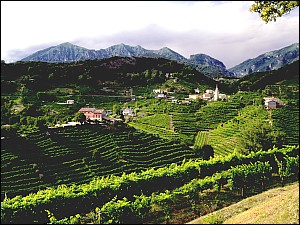It is over 150 years since the birth of Emmeline Pankhurst – the outspoken reformer committed to securing women’s right to vote in Great Britain(including Ireland). She was jailed on numerous occasions for her protests at the lack of political rights for women in the UK.On one occasion, while in prison on a conspiracy charge, she was allowed supply her own food and on the advise of her medical attendant drank wine every day.Her favourite wine was Chateau Lafite and her pal Ethel Smyth, another activist , sent four bottles of it to her at the prison.

The universal right to vote in Britain was granted only in the year of Pankhurst’s death, 1928.
Emmeline and her daughter Christabel led militant suffragists in a campaign which gripped Britain between 1905 and 1914. The government’s reaction seems incomprehensible today, and it provoked furious and passionate protests.
Women were battered in demonstrations and, on hunger strikes, brutally force-fed in prison. When the brutality nearly killed the prisoners, the Cat & Mouse Act was passed so that a hunger striker would be released and rearrested to continue her sentence. Under its terms, Mrs. Pankhurst, age 54 in 1912, went to prison 12 times that year.
Emmeline married Richard Pankhurst in 1879 – when she was 20 and he was 40. He was a brilliant lawyer and the author of the Married Women’s Property Acts of 1870 and 1882, which allowed women to keep earnings or property acquired before and after marriage.
Emmeline bore five children but lost two sons, and when she was widowed in 1898, she became a single mother without any inheritance.

In 1903 the Pankhurst women founded the Women’s Social and Political Union.
By 1905 the media had lost interest in the struggle for women’s rights. Newspapers rarely reported meetings and usually refused to publish articles and letters written by supporters of women’s suffrage.
In 1905 the WSPU decided to use different methods to obtain the publicity they thought would be needed in order to obtain the vote.

On 13th October 1905, Christabel Pankhurst and Annie Kenney attended a meeting in London to hear Sir Edward Grey, a minister in the British government. When Grey was talking, the two women constantly shouted out, “Will the Liberal Government give votes to women?” When the women refused to stop shouting the police were called to evict them from the meeting. Pankhurst and Kenney refused to leave and during the struggle a policeman claimed the two women kicked him.
Christabel Pankhurst and Annie Kenney were found guilty of assault and fined five shillings each. When the women refused to pay the fine they were sent to prison. The case shocked the nation. For the first time in Britain women had used violence in an attempt to win the vote.
In 1907 Emmeline moved to London and joined her two daughters in the militant struggle for the vote. For the next seven years she was imprisoned repeatedly. Pankhurst wrote:
We want to help women…We want to gain for them all the rights and protection that laws can give them. And, above all, we want the good influence of women to tell to its greatest extent in the social and moral questions of the time. But we cannot do this unless we have the vote and are recognised as citizens and voices to be listened to.
On 4th August, 1914, England declared war on Germany. Two days later the NUWSS announced that it was suspending all political activity until the war was over.
On the 10th August the government announced it was releasing all suffragettes from prison. In return, the WSPU agreed to end their militant activities and help the war effort.

WSPU organised a demonstration in London. Members carried banners with slogans such as ‘We Demand the Right to Serve’, ‘For Men Must Fight and Women Must work’
At the meeting, attended by 30,000 people, Emmeline Pankhurst called on trade unions to let women work in those industries traditionally dominated by men.
In 1918 the Representation of the People Act gave voting rights to women over 30.
Emmeline died on 14 June 1928, shortly after women were granted equal voting rights with men (at 21).
Evelyn






 In 1903 the Pankhurst women founded the Women’s Social and Political Union.
In 1903 the Pankhurst women founded the Women’s Social and Political Union. On 13th October 1905, Christabel Pankhurst and Annie Kenney attended a meeting in London to hear Sir Edward Grey, a minister in the British government. When Grey was talking, the two women constantly shouted out, “Will the Liberal Government give votes to women?” When the women refused to stop shouting the police were called to evict them from the meeting. Pankhurst and Kenney refused to leave and during the struggle a policeman claimed the two women kicked him.
On 13th October 1905, Christabel Pankhurst and Annie Kenney attended a meeting in London to hear Sir Edward Grey, a minister in the British government. When Grey was talking, the two women constantly shouted out, “Will the Liberal Government give votes to women?” When the women refused to stop shouting the police were called to evict them from the meeting. Pankhurst and Kenney refused to leave and during the struggle a policeman claimed the two women kicked him.  WSPU organised a demonstration in London. Members carried banners with slogans such as ‘We Demand the Right to Serve’, ‘For Men Must Fight and Women Must work’
WSPU organised a demonstration in London. Members carried banners with slogans such as ‘We Demand the Right to Serve’, ‘For Men Must Fight and Women Must work’










